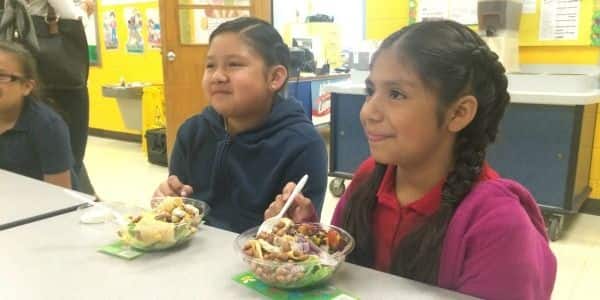What if school lunches were reimagined to reflect the made-to-order fast-casual dining trend? And what if students were inspired to eat healthier because of the choices they were offered? That’s exactly what’s happening in Austin, Texas. Since taking the reigns in 2012 Anneliese Tanner, nutrition and food services director for Austin Independent School District, has evolved the lunch program to empower students with choices and increase healthy food accessibility.
A Made-to-Order Salad Bar in Every Elementary School
Choices aren’t often copious in the cafeteria line—unless you’re an elementary student in AISD. Under Tanner’s direction, the district set a goal of having each of its 80 elementary schools outfitted with a made-to-order salad bar in the cafeteria line by spring 2017. Research has shown that kids with access to a salad bar consume three times more fruits and vegetables. And with AISD’s made-to-order salad bars, healthy options are plentiful. Students are able to pick two to four vegetables, up to two proteins, one grain, and a leafy green base for their customized salads.
“Our made-to-order entree salad bars allow us to meet many priorities,” explained Tanner. “Students are able to customize their meal to meet their tastes, gain exposure to a variety of produce and food ways, and most importantly, create a healthy habit of making vegetables the center of their plate."
The salad bars have a seasonal theme and offer locally sourced ingredients when possible. The program’s first theme is a fiesta salad bar that features sweet peppers from Johnson's Backyard Garden, a small family-run and community-supported farm in the Austin area. With 16 compartments, the salad bars can also accommodate a variety of dietary needs from gluten-free and diary-free to vegan and vegetarian. All that, and the offerings meet the guidelines for the national school lunch program too.
Rolling With the Food Truck Trend
In 2015 Tanner and AISD Food Services introduced the district's first food truck in an effort to provide high school students with healthy meal options in a new way. The Nacho Average Food Truck launched at Anderson High School with a changing menu that incorporated some locally sourced ingredients. It proved to be a success. The truck reflected the food truck-centric culture of the Austin dining scene yet was a novelty on campus. Plus, it met USDA nutrition regulations and operated under the National School Lunch Program.
This fall, with support from Whole Kids Foundation, AISD is expanding its food truck fleet to serve 11 additional high school campuses. The trucks will update their concept and menu seasonally. The menus will be different than offerings in the cafeterias in order to provide more choices to the students. With an overall vision to expand ethnic cuisine throughout the district, the first theme will be Vietnamese food.
Garden to Cafeteria
Imagine enjoying freshly harvested greens from a thriving garden just outside your door. Now imagine that scene at a school—or better yet, in a whole school district. AISD is ensuring that dream comes to fruition through its new Garden to Café Program, which allows school garden produce to be served in school meals.
While nearly 100 of the district’s schools already had gardens on site, the 2016-2017 school year is the first time AISD schools are growing a crop with the sole purpose of serving it for lunch. A “Call to Plant” went out in September asking schools to plant any variety of greens to be used in a braised greens recipe, which will appear on lunch menus in November. The policy change paired with the “Call to Plant” aims to increase students’ access to healthy, garden-grown foods.
School Foods Superhero Award
For the immediate and long-term impact she is making on the health and wellness of students within AISD, Whole Kids Foundation is awarding Anneliese Tanner with its inaugural School Foods Superhero Award.
“Our kids deserve to have champions who will work tirelessly to make sure that they can reach their full potential. Anneliese is that kind of superhero,” explained Nona Evans, executive director of Whole Kids Foundation. “She understands that a well-nourished child is ready to learn and is ready for life. She’s willing to use her superpowers—a passion for real food and a keen understanding of finance — to create change that is resulting in choice for kids via salad bars.”
From evolving school cafeterias and gardens to introducing campus food trucks, AISD—under the direction of Anneliese Tanner—has taken on a leadership role in the Austin community and beyond in motivating students to make long-term healthy choices.



